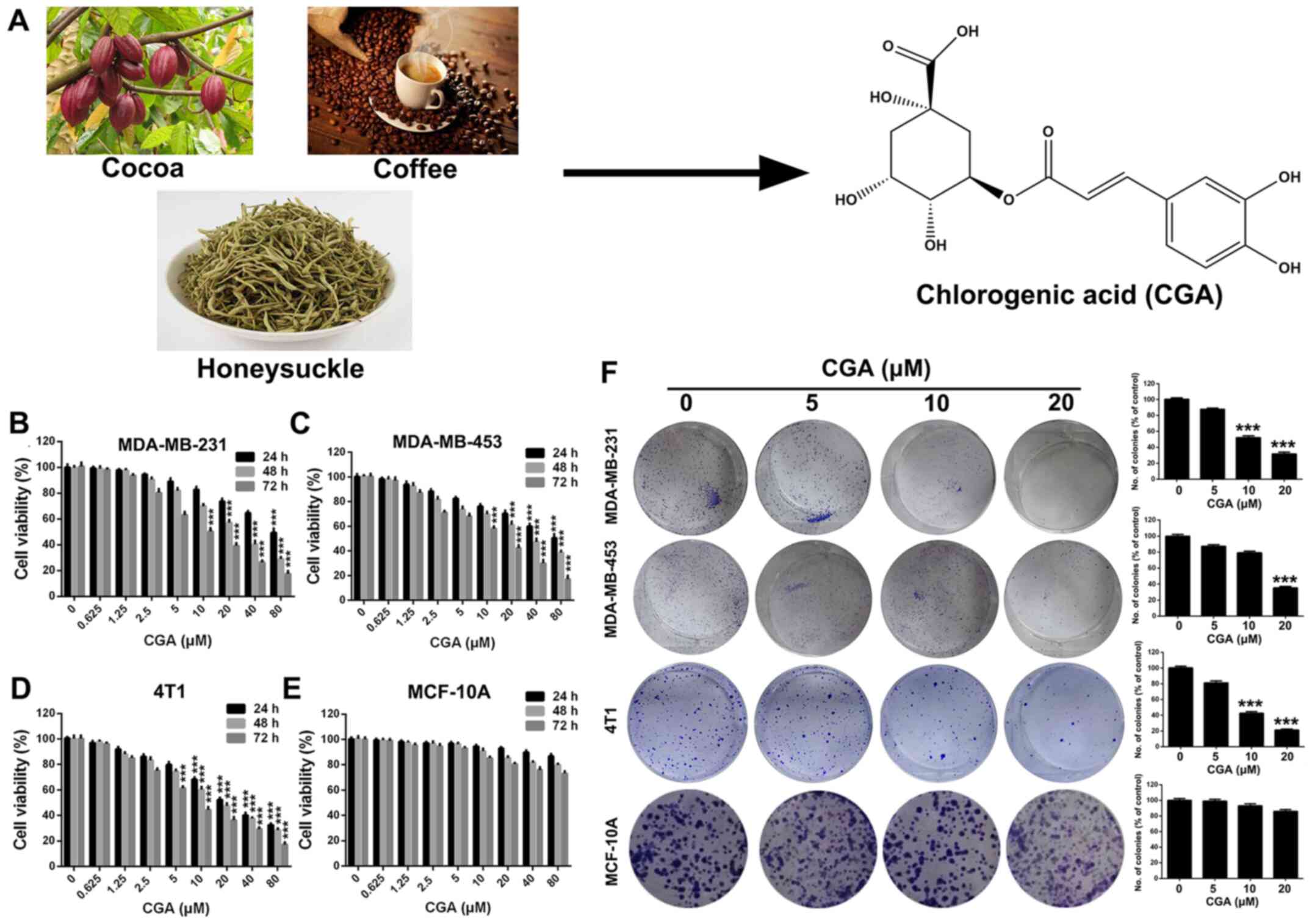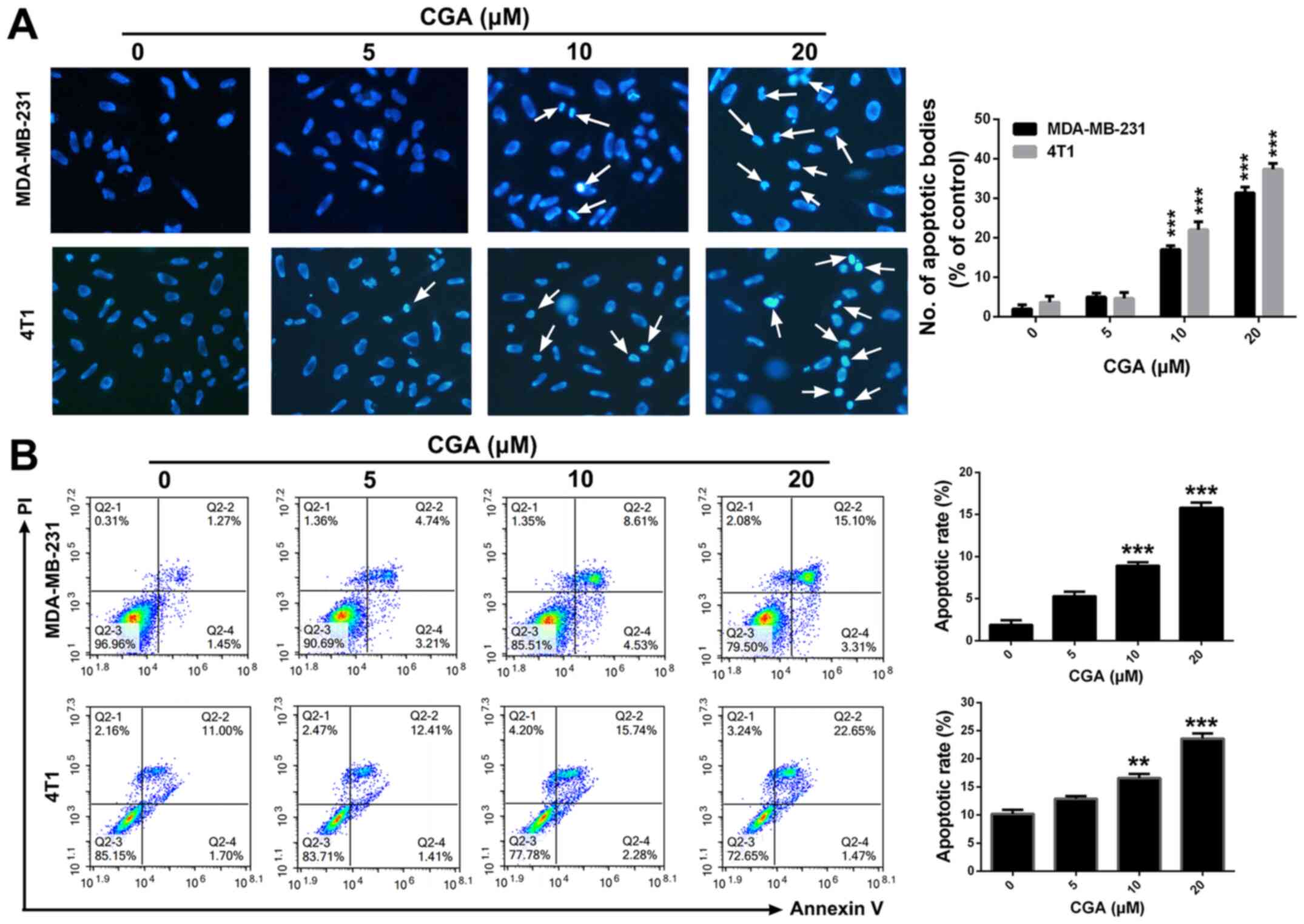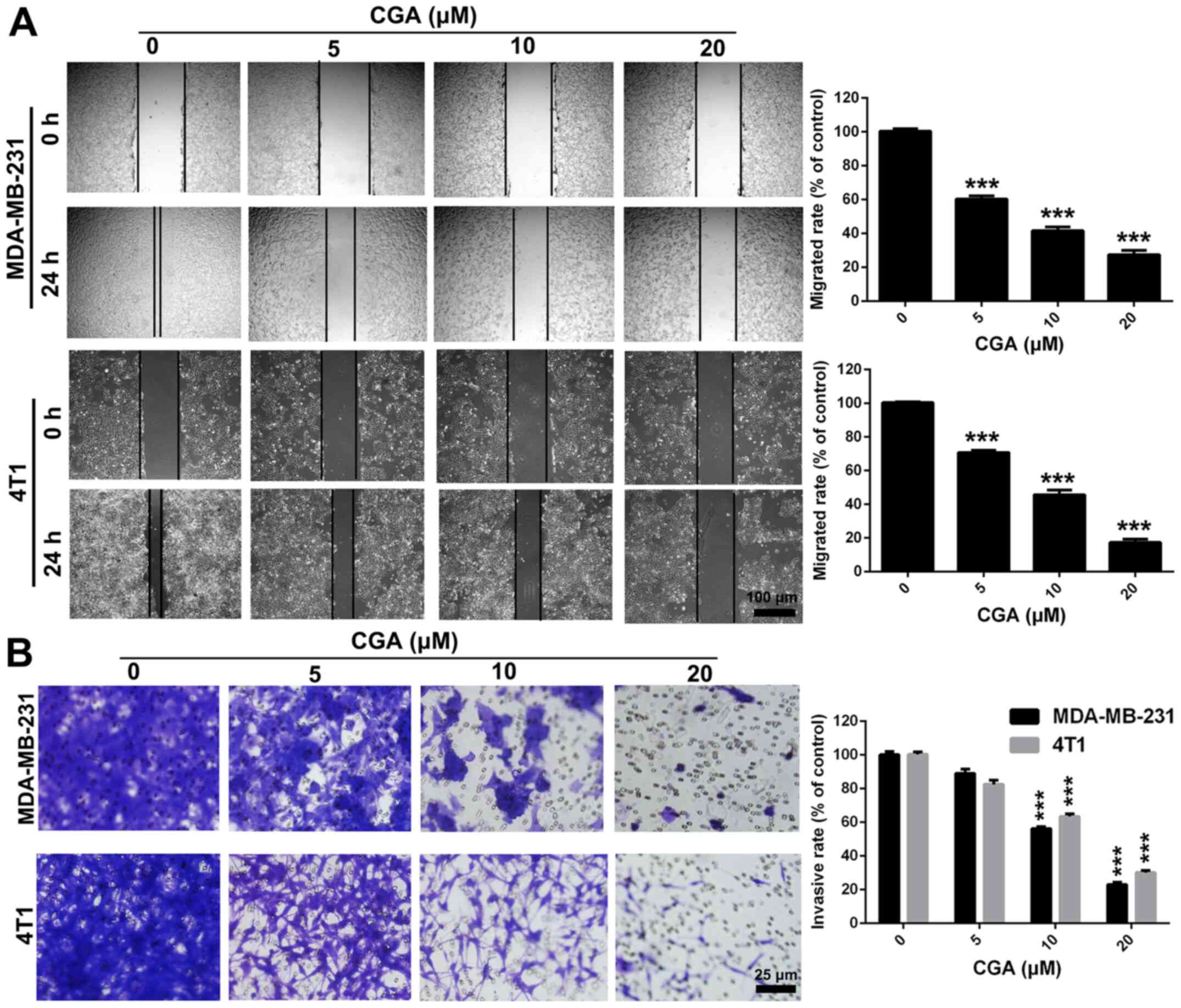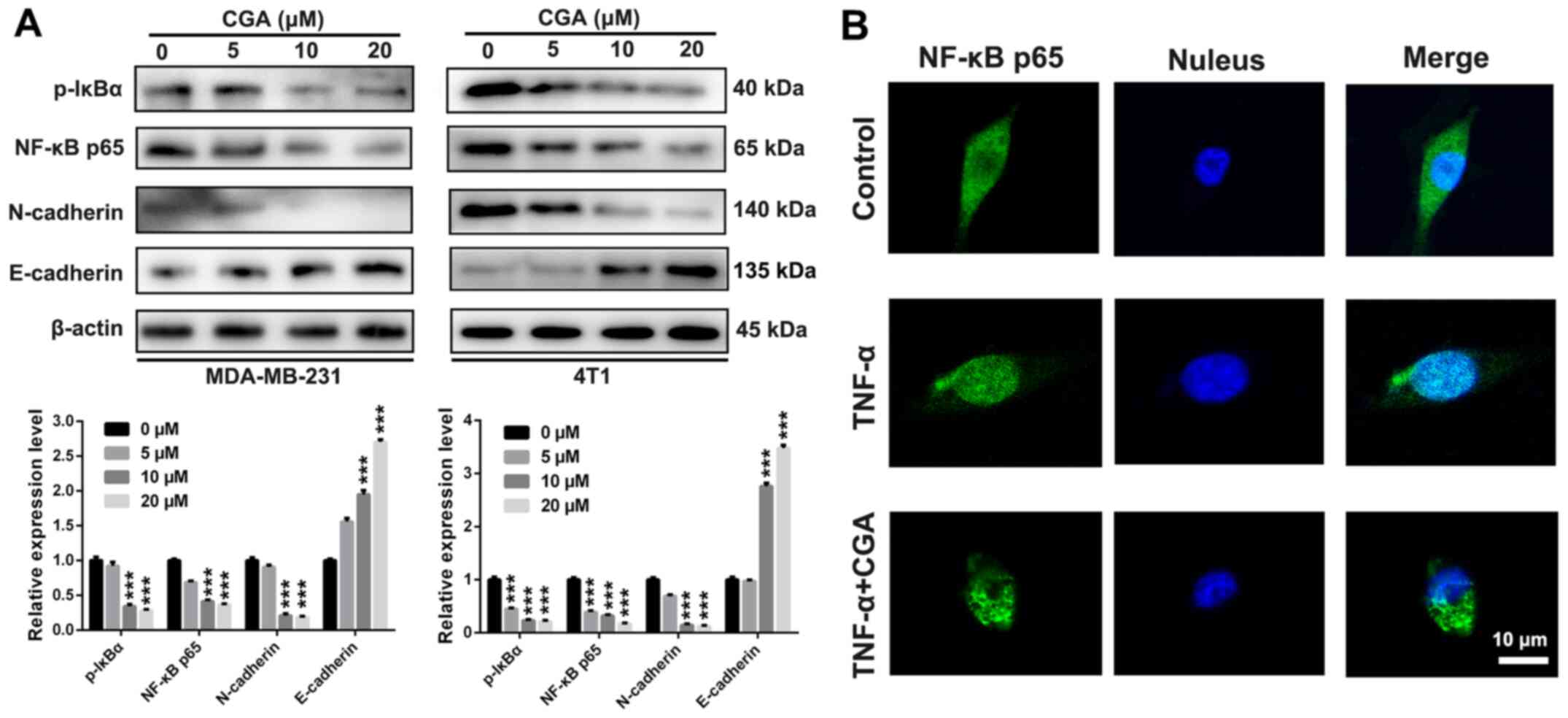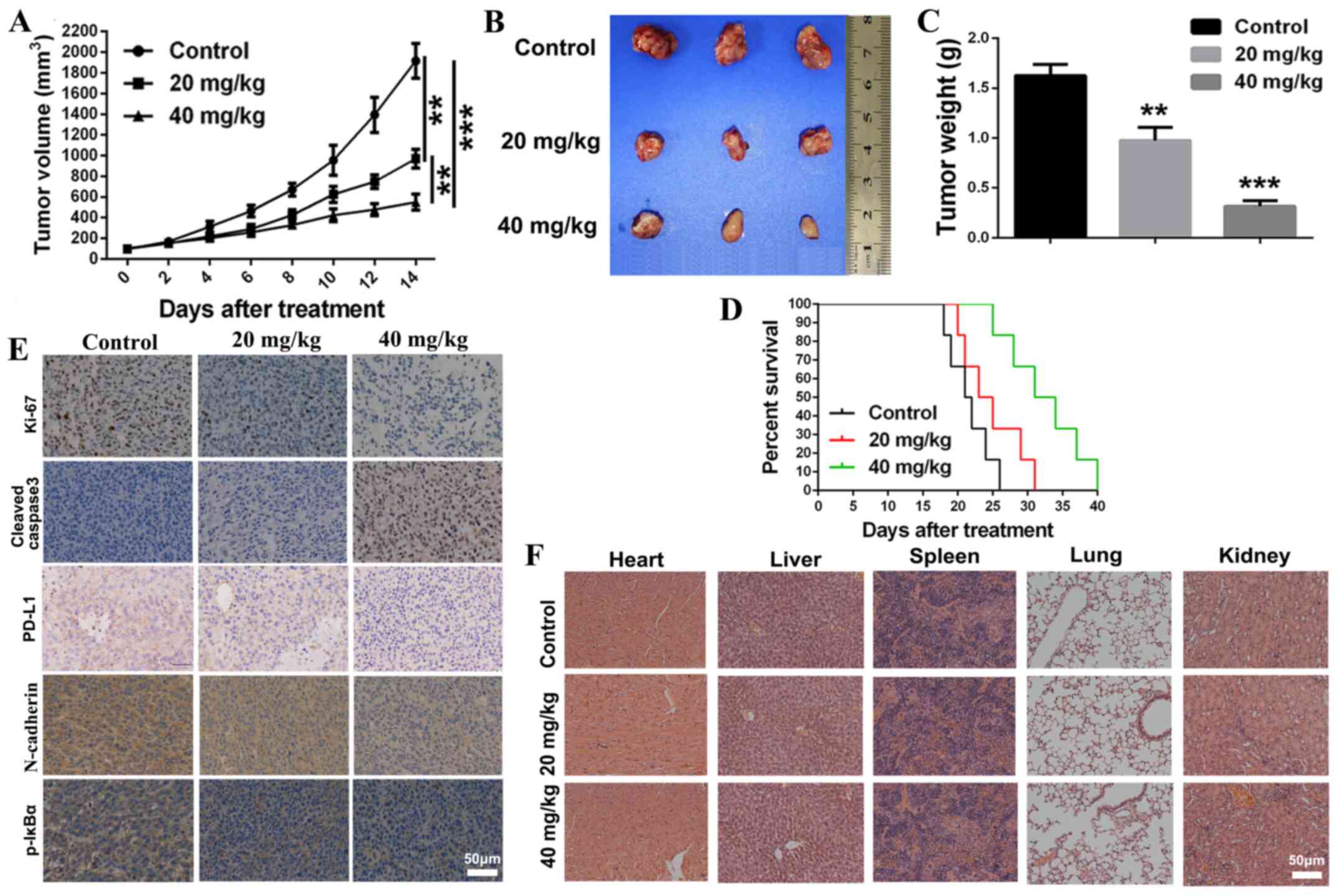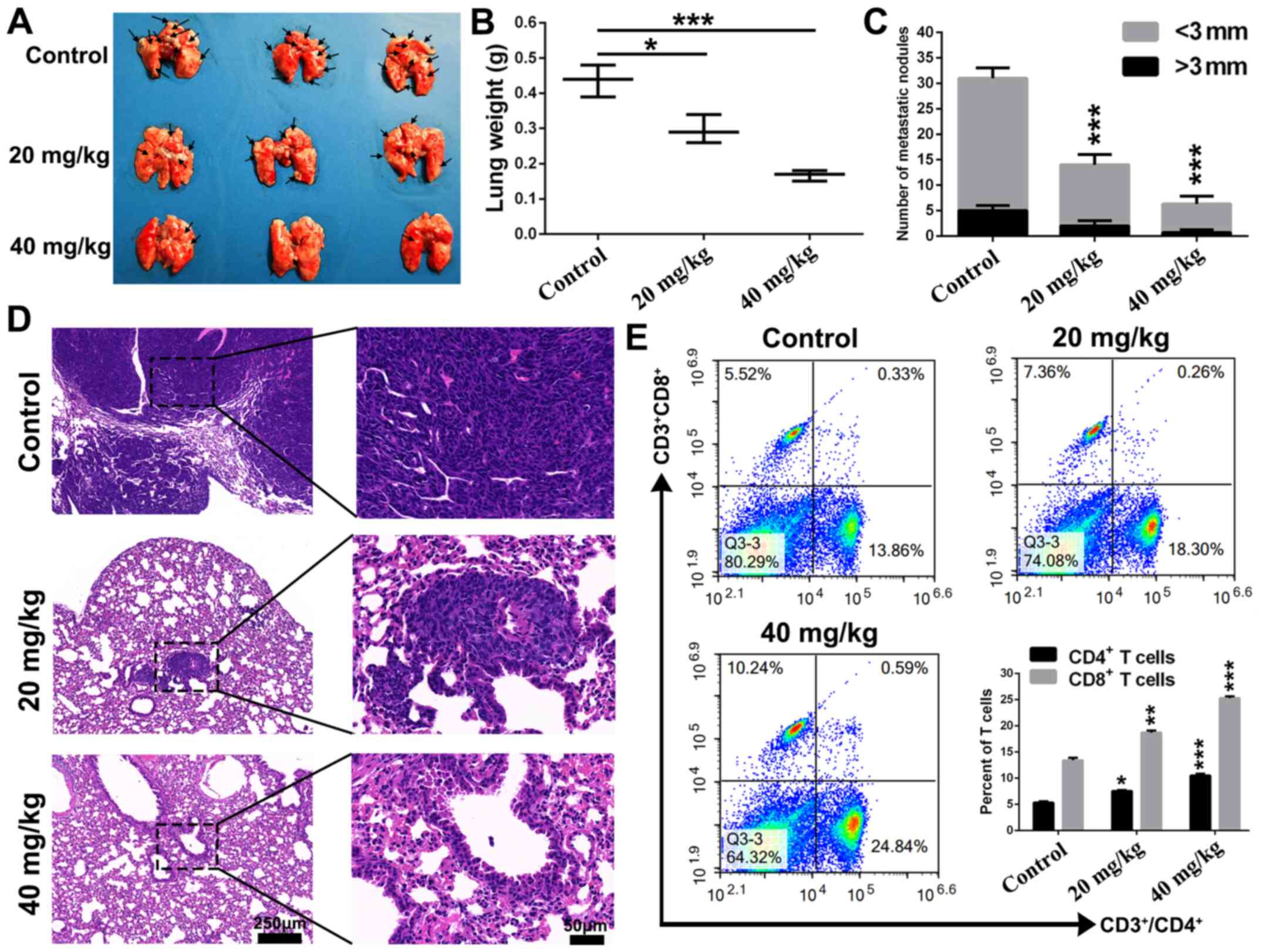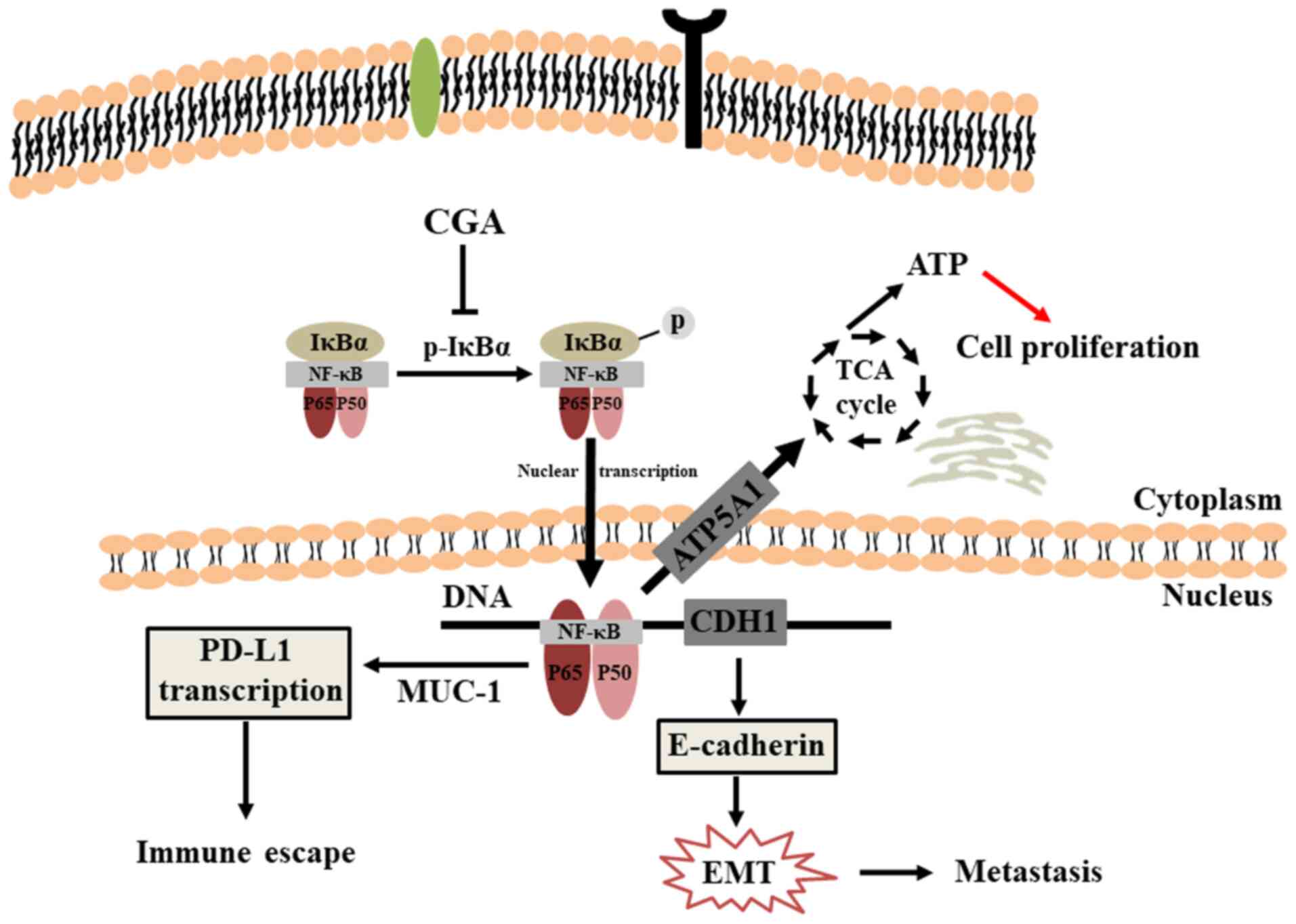|
1
|
Waks AG and Winer EP: Breast cancer
treatment: A Review. JAMA. 321:288–300. 2019. View Article : Google Scholar : PubMed/NCBI
|
|
2
|
Bray F, Ferlay J, Soerjomataram I, Siegel
RL, Torre LA and Jemal A: Global cancer statistics 2018: GLOBOCAN
estimates of incidence and mortality worldwide for 36 cancers in
185 countries. CA Cancer J Clin. 68:394–424. 2018. View Article : Google Scholar : PubMed/NCBI
|
|
3
|
Siegel RL, Miller KD and Jemal A: Cancer
statistics, 2020. CA Cancer J Clin. 70:7–30. 2020. View Article : Google Scholar : PubMed/NCBI
|
|
4
|
Couch FJ, Hart SN, Sharma P, Toland AE,
Wang X, Miron P, Olson JE, Godwin AK, Pankratz VS, Olswold C, et
al: Inherited mutations in 17 breast cancer susceptibility genes
among a large triple-negative breast cancer cohort unselected for
family history of breast cancer. J Clin Oncol. 33:304–311. 2015.
View Article : Google Scholar : PubMed/NCBI
|
|
5
|
Claessens AK, Erdkamp FL, Lopez-Yurda M,
Bouma JM, Rademaker-Lakhai JM, Honkoop AH, de Graaf H, Tjan-Heijnen
VC and Bos ME: Secondary analyses of the randomized phase III
Stop&Go study: Efficacy of second-line intermittent versus
continuous chemotherapy in HER2-negative advanced breast cancer.
Acta Oncol. 59:1–10. 2020. View Article : Google Scholar : PubMed/NCBI
|
|
6
|
Bale R, Putzer D and Schullian P: Local
treatment of breast cancer liver metastasis. Cancers (Basel).
11:112019. View Article : Google Scholar
|
|
7
|
Song L, Chen X, Mi L, Liu C, Zhu S, Yang
T, Luo X, Zhang Q, Lu H and Liang X: Icariin-induced inhibition of
SIRT6/NF-kappaB triggers redox mediated apoptosis and enhances
anti-tumor immunity in triple-negative breast cancer. Cancer Sci.
11:4242–4256. 2020. View Article : Google Scholar
|
|
8
|
Zeng A, Liang X, Zhu S, Liu C, Luo X,
Zhang Q and Song L: Baicalin, a potent inhibitor of NF-kappaB
signaling pathway, enhances chemosensitivity of breast cancer cells
to docetaxel and inhibits tumor growth and metastasis both in vitro
and in vivo. Front Pharmacol. 11:8792020. View Article : Google Scholar : PubMed/NCBI
|
|
9
|
Sen R and Baltimore D: Multiple nuclear
factors interact with the immunoglobulin enhancer sequences. Cell.
46:705–716. 1986. View Article : Google Scholar : PubMed/NCBI
|
|
10
|
Baldwin AS Jr: The NF-kappa B and I kappa
B proteins: New discoveries and insights. Annu Rev Immunol.
14:649–683. 1996. View Article : Google Scholar : PubMed/NCBI
|
|
11
|
Kumar A, Takada Y, Boriek AM and Aggarwal
BB: Nuclear factor-kappaB: Its role in health and disease. J Mol
Med (Berl). 82:434–448. 2004. View Article : Google Scholar : PubMed/NCBI
|
|
12
|
Wong ET and Tergaonkar V: Roles of
NF-kappaB in health and disease: Mechanisms and therapeutic
potential. Clin Sci (Lond). 116:451–465. 2009. View Article : Google Scholar : PubMed/NCBI
|
|
13
|
Gyrd-Hansen M and Meier P: IAPs: From
caspase inhibitors to modulators of NF-kappaB, inflammation and
cancer. Nat Rev Cancer. 10:561–574. 2010. View Article : Google Scholar : PubMed/NCBI
|
|
14
|
Cao Y, Luo JL and Karin M: IkappaB kinase
alpha kinase activity is required for self-renewal of
ErbB2/Her2-transformed mammary tumor-initiating cells. Proc Natl
Acad Sci USA. 104:15852–15857. 2007. View Article : Google Scholar : PubMed/NCBI
|
|
15
|
Huang S, Pettaway CA, Uehara H, Bucana CD
and Fidler IJ: Blockade of NF-kappaB activity in human prostate
cancer cells is associated with suppression of angiogenesis,
invasion, and metastasis. Oncogene. 20:4188–4197. 2001. View Article : Google Scholar : PubMed/NCBI
|
|
16
|
Poligone B and Baldwin AS: Positive and
negative regulation of NF-kappaB by COX-2: Roles of different
prostaglandins. J Biol Chem. 276:38658–38664. 2001. View Article : Google Scholar : PubMed/NCBI
|
|
17
|
Ahmad A, Biersack B, Li Y, Kong D, Bao B,
Schobert R, Padhye S and Sarkar F: Targeted regulation of
PI3K/Akt/mTOR/NF-kappaB signaling by indole compounds and their
derivatives: Mechanistic details and biological implications for
cancer therapy. Anticancer Agents Med Chem. 13:1002–1013. 2013.
View Article : Google Scholar : PubMed/NCBI
|
|
18
|
Zhen X, Choi HS, Kim JH, Kim SL, Ren Liu
R, Yun BS and Lee DS: Machilin D, a lignin derived from Saururus
chinensis, suppresses breast cancer stem cells and inhibits
NF-kappaB signaling. Biomolecules. 10:2452020. View Article : Google Scholar
|
|
19
|
Senthil Kumar KJ, Gokila Vani M, Hsieh HW,
Lin CC, Liao JW, Chueh PJ and Wang SY: MicroRNA-708 activation by
glucocorticoid receptor agonists regulate breast cancer
tumorigenesis and metastasis via downregulation of NF-kappaB
signaling. Carcinogenesis. 40:335–348. 2019. View Article : Google Scholar : PubMed/NCBI
|
|
20
|
Orlova Z, Pruefer F, Castro-Oropeza R,
Ordaz-Ramos A, Zampedri C, Maldonado V, Vazquez-Santillan K and
Melendez-Zajgla J: IKKepsilon regulates the breast cancer stem cell
phenotype. Biochim Biophys Acta Mol Cell Res. 1866:598–611. 2019.
View Article : Google Scholar : PubMed/NCBI
|
|
21
|
Meng S, Cao J, Feng Q, Peng J and Hu Y:
Roles of chlorogenic Acid on regulating glucose and lipids
metabolism: A review. Evid Based Complement Alternat Med.
801457:20132013.
|
|
22
|
dos Santos MD, Almeida MC, Lopes NP and de
Souza GE: Evaluation of the anti-inflammatory, analgesic and
antipyretic activities of the natural polyphenol chlorogenic acid.
Biol Pharm Bull. 29:2236–2240. 2006. View Article : Google Scholar : PubMed/NCBI
|
|
23
|
Kono Y, Kobayashi K, Tagawa S, Adachi K,
Ueda A, Sawa Y and Shibata H: Antioxidant activity of polyphenolics
in diets. Rate constants of reactions of chlorogenic acid and
caffeic acid with reactive species of oxygen and nitrogen. Biochim
Biophys Acta. 1335:335–342. 1997. View Article : Google Scholar : PubMed/NCBI
|
|
24
|
Neuwirthova J, Gal B, Smilek P and
Urbankova P: Coffee in cancer chemoprevention. Klin Onkol.
30:106–114. 2017. View Article : Google Scholar : PubMed/NCBI
|
|
25
|
Luo C, Xu X, Wei X, Feng W, Huang H, Liu
H, Xu R, Lin J, Han L and Zhang D: Natural medicines for the
treatment of fatigue: Bioactive components, pharmacology, and
mechanisms. Pharmacol Res. 148:1044092019. View Article : Google Scholar : PubMed/NCBI
|
|
26
|
Buldak RJ, Hejmo T, Osowski M, Bułdak L,
Kukla M, Polaniak R and Birkner E: The impact of coffee and its
selected bioactive compounds on the development and progression of
colorectal cancer in vivo and in vitro. Molecules. 23:33092018.
View Article : Google Scholar
|
|
27
|
Feng R, Lu Y, Bowman LL, Qian Y,
Castranova V and Ding M: Inhibition of activator protein-1,
NF-kappaB, and MAPKs and induction of phase 2 detoxifying enzyme
activity by chlorogenic acid. J Biol Chem. 280:27888–27895. 2005.
View Article : Google Scholar : PubMed/NCBI
|
|
28
|
Kang NJ, Lee KW, Kim BH, Bode AM, Lee HJ,
Heo YS, Boardman L, Limburg P, Lee HJ and Dong Z: Coffee phenolic
phytochemicals suppress colon cancer metastasis by targeting MEK
and TOPK. Carcinogenesis. 32:921–928. 2011. View Article : Google Scholar : PubMed/NCBI
|
|
29
|
Zhang T, Chen S, Chen L, Zhang L, Meng F,
Sha S, Ai C and Tai J: Chlorogenic acid ameliorates lead-induced
renal damage in mice. Biol Trace Elem Res. 189:109–117. 2019.
View Article : Google Scholar : PubMed/NCBI
|
|
30
|
Tian L, Su CP, Wang Q, Wu FJ, Bai R, Zhang
HM, Liu JY, Lu WJ, Wang W, Lan F, et al: Chlorogenic acid: A potent
molecule that protects cardiomyocytes from TNF-alpha-induced injury
via inhibiting NF-kappaB and JNK signals. J Cell Mol Med.
23:4666–4678. 2019. View Article : Google Scholar : PubMed/NCBI
|
|
31
|
Arfian N, Wahyudi DA, Zulfatina IB, Citta
AN, Anggorowati N, Multazam A, Romi MM and Sari DC: Chlorogenic
acid attenuates kidney ischemic/reperfusion injury via reducing
inflammation, tubular injury, and myofibroblast formation. BioMed
Res Int. 5423703:20192019.
|
|
32
|
Hamidi H and Ivaska J: Every step of the
way: Integrins in cancer progression and metastasis. Nat Rev
Cancer. 18:533–548. 2018. View Article : Google Scholar : PubMed/NCBI
|
|
33
|
Yuan Y, Gong X, Zhang L, Jiang R, Yang J,
Wang B and Wan J: Chlorogenic acid ameliorated concanavalin
A-induced hepatitis by suppression of Toll-like receptor 4
signaling in mice. Int Immunopharmacol. 44:97–104. 2017. View Article : Google Scholar : PubMed/NCBI
|
|
34
|
Peart O: Metastatic breast cancer. Radiol
Technol. 88:519M–539M. 2017.PubMed/NCBI
|
|
35
|
Huang S, Wang LL, Xue NN, Li C, Guo HH,
Ren TK, Zhan Y, Li WB, Zhang J, Chen XG, et al: Chlorogenic acid
effectively treats cancers through induction of cancer cell
differentiation. Theranostics. 9:6745–6763. 2019. View Article : Google Scholar : PubMed/NCBI
|
|
36
|
Yamagata K, Izawa Y, Onodera D and Tagami
M: Chlorogenic acid regulates apoptosis and stem cell
marker-related gene expression in A549 human lung cancer cells. Mol
Cell Biochem. 441:9–19. 2018. View Article : Google Scholar : PubMed/NCBI
|
|
37
|
Lee MS, Lee SO, Kim KR and Lee HJ:
Sphingosine kinase-1 involves the inhibitory action of HIF-1alpha
by chlorogenic acid in hypoxic DU145 cells. Int J Mol Sci.
18:3252017. View Article : Google Scholar
|
|
38
|
Friedl P and Wolf K: Tumour-cell invasion
and migration: Diversity and escape mechanisms. Nat Rev Cancer.
3:362–374. 2003. View Article : Google Scholar : PubMed/NCBI
|
|
39
|
Bollrath J and Greten FR: IKK/NF-kappaB
and STAT3 pathways: Central signalling hubs in
inflammation-mediated tumour promotion and metastasis. EMBO Rep.
10:1314–1319. 2009. View Article : Google Scholar : PubMed/NCBI
|
|
40
|
Aiello NM and Kang Y: Context-dependent
EMT programs in cancer metastasis. J Exp Med. 216:1016–1026. 2019.
View Article : Google Scholar : PubMed/NCBI
|
|
41
|
Li J, Peng W, Yang P, Chen R, Gu Q, Qian
W, Ji D, Wang Q, Zhang Z, Tang J, et al: MicroRNA-1224-5p inhibits
metastasis and epithelial-mesenchymal transition in colorectal
cancer by targeting SP1-mediated NF-kappaB signaling pathways.
Front Oncol. 10:2942020. View Article : Google Scholar : PubMed/NCBI
|
|
42
|
Ning N, Liu S, Liu X, Tian Z, Jiang Y, Yu
N, Tan B, Feng H, Feng X and Zou L: Curcumol inhibits the
proliferation and metastasis of melanoma via the
miR-152-3p/PI3K/AKT and ERK/NF-kappaB signaling pathways. J Cancer.
11:1679–1692. 2020. View Article : Google Scholar : PubMed/NCBI
|
|
43
|
Pallasch FB and Schumacher U: Angiotensin
inhibition, TGF-beta and EMT in cancer. Cancers (Basel).
12:27852020. View Article : Google Scholar
|
|
44
|
Dai B, Fan M, Yu R, Su Q, Wang B, Yang T,
Liu F and Zhang Y: Novel diphenyl urea derivative serves as an
inhibitor on human lung cancer cell migration by disrupting EMT via
Wnt/beta-catenin and PI3K/Akt signaling. Toxicol In Vitro.
69:1050002020. View Article : Google Scholar : PubMed/NCBI
|
|
45
|
Du P, Zeng H, Xiao Y, Zhao Y, Zheng B,
Deng Y, Liu J, Huang B, Zhang X, Yang K, et al: Chronic stress
promotes EMT-mediated metastasis through activation of STAT3
signaling pathway by miR-337-3p in breast cancer. Cell Death Dis.
11:7612020. View Article : Google Scholar : PubMed/NCBI
|
|
46
|
Pastushenko I and Blanpain C: EMT
Transition States during Tumor Progression and Metastasis. Trends
Cell Biol. 29:212–226. 2019. View Article : Google Scholar : PubMed/NCBI
|
|
47
|
Mohme M, Maire CL, Schliffke S, Joosse SA,
Alawi M, Matschk J, Schüller U, Dierlamm J, Martens T, Pantel K, et
al: Molecular profiling of an osseous metastasis in glioblastoma
during checkpoint inhibition: Potential mechanisms of immune
escape. Acta Neuropathol Commun. 8:282020. View Article : Google Scholar : PubMed/NCBI
|
|
48
|
Xue N, Zhou Q, Ji M, Jin J, Lai F, Chen J,
Zhang M, Jia J, Yang H, Zhang J, et al: Chlorogenic acid inhibits
glioblastoma growth through repolarizating macrophage from M2 to M1
phenotype. Sci Rep. 7:390112017. View Article : Google Scholar : PubMed/NCBI
|















